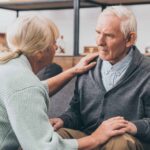
Tips to Consider for Healthy Aging
September 25, 2020
Tips for Dementia Caregivers
October 16, 2020Dementia is a general term for brain conditions that cause deterioration in memory, thinking, behavior, and reasoning skills. The signs of dementia start out slowly and gradually worsen enough to interfere with daily activities. Alzheimer’s disease is the most common type of dementia. Dementia mostly affects older adults; however, it is not a part of normal aging.
Dementia symptoms
Dementia symptoms can vary from person to person. Common symptoms include:
- Memory loss
- Difficulty communicating
- Difficulty reasoning, judgment, and problem solving
- General confusion
Risk Factors for Developing Dementia
- Age – dementia isn’t a normal part of aging, but the risk for dementia increase with age, especially after age 65.
- Genetic / Family history – Some forms of dementia have a genetic component and it often runs in families.
- Race/ethnicity – certain ethnic communities appear to be at higher risk of dementia than others Older African Americans and South Asian are more likely to have dementia than whites.
- Poor heart health – High blood pressure, high cholesterol, or a stroke can increase the risk of developing vascular dementia if not treated properly.
- Head injury – severe or repeated head injuries can increase the risk of developing dementia.
Types of dementia
The brain has many distinct regions, each is responsible for different functions. Different types of dementia are associated with specific types of brain cell damage in particular regions of the brain. When brain cells in the affected region are damaged, that region cannot perform its functions normally.
Alzheimer’s disease – Alzheimer’s disease is the most common forms of dementia. It is a progressive disease that affects parts of the brain that control thinking, memory and language. Experts believe that a small percentage of Alzheimer’s disease is related to genetic factors.
Vascular dementia – type of dementia is linked to strokes or damage to the vessels that supply blood to the brain. Symptoms depend on which part of the brain is affected, the most common symptoms of vascular dementia are difficulties with concentrating, planning, thinking, and problem solving.
Lewy body dementia – this type of dementia is caused by protein deposits, called Lewy bodies, develop in nerve cells in the brain affecting thinking, memory and movement. People with this form of dementia may experience problems getting sleep, hallucinations, and Parkinson’s disease-like symptoms such slow movement, balance problems, rigid muscles, and tremors.
Frontotemporal dementia- This type of dementia affects the part of the brain that’s generally associated with personality, behavior and language. Common symptoms include changes in personality, behavior, difficulty speaking, and understanding.
Mixed dementia- it’s a condition in which a person has combination of two or more types of dementia. For example, a person may have Alzheimer’s disease and vascular dementia. Mixed dementia is much more common in older age groups, such as those over 80 years. Disease progression may be faster than with one kind of dementia.




